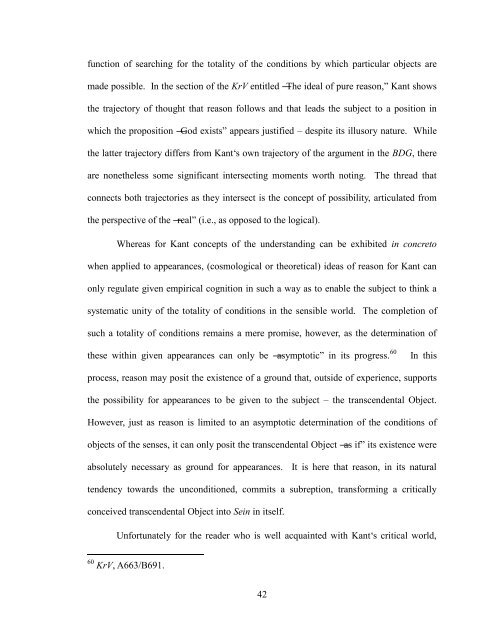The Doctrine of Self-positing and Receptivity in Kant's Late ...
The Doctrine of Self-positing and Receptivity in Kant's Late ...
The Doctrine of Self-positing and Receptivity in Kant's Late ...
Create successful ePaper yourself
Turn your PDF publications into a flip-book with our unique Google optimized e-Paper software.
function <strong>of</strong> search<strong>in</strong>g for the totality <strong>of</strong> the conditions by which particular objects are<br />
made possible. In the section <strong>of</strong> the KrV entitled ―<strong>The</strong> ideal <strong>of</strong> pure reason,‖ Kant shows<br />
the trajectory <strong>of</strong> thought that reason follows <strong>and</strong> that leads the subject to a position <strong>in</strong><br />
which the proposition ―God exists‖ appears justified – despite its illusory nature. While<br />
the latter trajectory differs from Kant‘s own trajectory <strong>of</strong> the argument <strong>in</strong> the BDG, there<br />
are nonetheless some significant <strong>in</strong>tersect<strong>in</strong>g moments worth not<strong>in</strong>g. <strong>The</strong> thread that<br />
connects both trajectories as they <strong>in</strong>tersect is the concept <strong>of</strong> possibility, articulated from<br />
the perspective <strong>of</strong> the ―real‖ (i.e., as opposed to the logical).<br />
Whereas for Kant concepts <strong>of</strong> the underst<strong>and</strong><strong>in</strong>g can be exhibited <strong>in</strong> concreto<br />
when applied to appearances, (cosmological or theoretical) ideas <strong>of</strong> reason for Kant can<br />
only regulate given empirical cognition <strong>in</strong> such a way as to enable the subject to th<strong>in</strong>k a<br />
systematic unity <strong>of</strong> the totality <strong>of</strong> conditions <strong>in</strong> the sensible world. <strong>The</strong> completion <strong>of</strong><br />
such a totality <strong>of</strong> conditions rema<strong>in</strong>s a mere promise, however, as the determ<strong>in</strong>ation <strong>of</strong><br />
these with<strong>in</strong> given appearances can only be ―asymptotic‖ <strong>in</strong> its progress. 60 In this<br />
process, reason may posit the existence <strong>of</strong> a ground that, outside <strong>of</strong> experience, supports<br />
the possibility for appearances to be given to the subject – the transcendental Object.<br />
However, just as reason is limited to an asymptotic determ<strong>in</strong>ation <strong>of</strong> the conditions <strong>of</strong><br />
objects <strong>of</strong> the senses, it can only posit the transcendental Object ―as if‖ its existence were<br />
absolutely necessary as ground for appearances. It is here that reason, <strong>in</strong> its natural<br />
tendency towards the unconditioned, commits a subreption, transform<strong>in</strong>g a critically<br />
conceived transcendental Object <strong>in</strong>to Se<strong>in</strong> <strong>in</strong> itself.<br />
Unfortunately for the reader who is well acqua<strong>in</strong>ted with Kant‘s critical world,<br />
60 KrV, A663/B691.<br />
42


